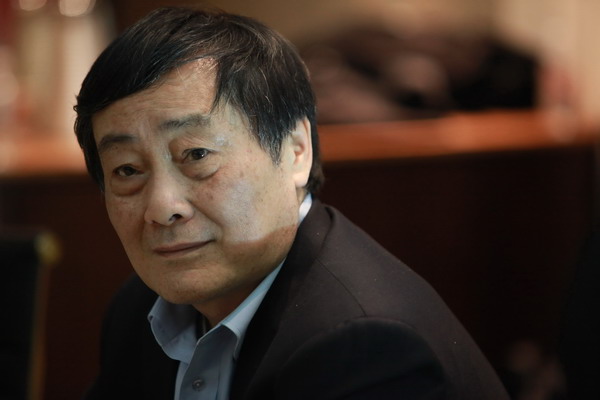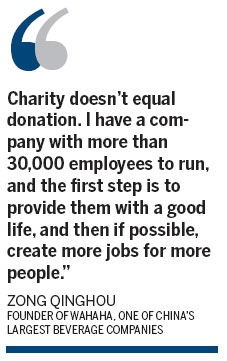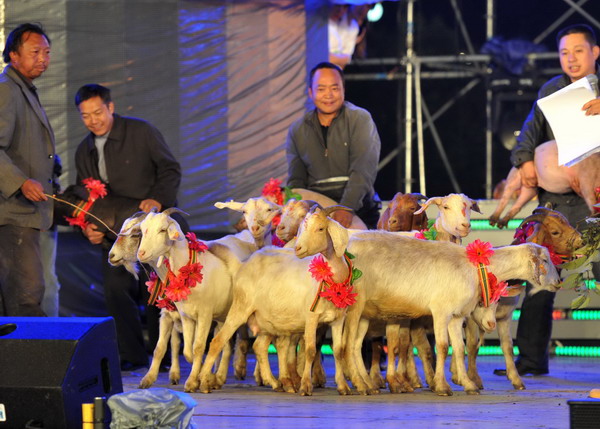Society
Rich realize value of giving for charity
Updated: 2011-09-27 07:50
By Xu Junqian and Wang Yan (China Daily)
|
 Chen Guangbiao (right) sings at the rehearsal before his concert on Sunday night. [Photo/provided to China Daily]
|
Various methods used to help less well-off, Xu Junqian in Shanghai and Wang Yan in Beijing report.
An audience of 6,000 was expected for the concert in Guizhou province, but more than 20,000 attended. The singer topping the bill was no rock star but 43-year-old businessman and high-profile philanthropist, Chen Guangbiao.
Many of the concert-goers might have turned up anyway for the free livestock and farm tools Chen had promised to give out after the Sunday night show in Bijie's city square.
|
||||
After the two-hour concert of pop songs, including some he had penned himself, Chen handed over 2,000 pigs, 1,000 sheep and 113 tractors to the Bijie city government, asking that they be given to farmers in need.
"All boars and rams were wearing green flowers, and the sows and ewes were wearing red flowers," Chen said. "I hope people will soon have lambs and piglets at home."
Chen said he will check with the local government in a month's time. "I've asked them to put distribution details online."
After 30 years of unprecedented economic growth, the commercial elite, like Chen, are looking for ways to put their money into the hands of those less fortunate. The methods they choose vary.
|
 Pigs, adorned with flowers, are presented during a rehearsal on Saturday prior to a charity concert on Sunday starring businessman Chen Guangbiao in Bijie city, Guizhou province. Chen gave away 1,000 sheep, 2,000 pigs and 113 tractors to farmers. [Photo by Zheng Xiongzeng/for China Daily]
|
In June, Zong Qinghou, ranked by Forbes China as the third richest man in China, told Xinhua News Agency he will set up a family foundation with initial capital of about 2 million yuan ($309,000).
The amount may seem paltry compared with his $5.9 billion in assets, but the founder of one of China's largest beverage companies, Wahaha, also said he will set aside part of the annual bonuses he receives from Wahaha's 150 companies and use it as "a continuous capital" for the foundation.
"Mr Zong has been nurturing the idea of setting up a family foundation for years," said Shan Qining, director of Wahaha's communication office. He would not provide further details about his boss' new cause.
Ren Shaoying, also from Wahaha's communication office, said this is not the first time the company has been involved with charitable causes. It has already invested 250 million yuan through the Wahaha Foundation to build schools, help those less fortunate and sponsor teachers to teach in western China.
The government's Ministry of Civil Affairs has already approved the foundation.
The new family foundation is to function as an internationally recognized prize, similar to the Nobel Prize, encouraging scientific innovation and offering more educational opportunities to underprivileged people.
'Like spring rain'
The move is seen as a big gesture by 66-year-old Zong, a Hangzhou native who, with many other Zhejiang corporate titans, turned down Warren Buffett and Bill Gates' charity dinner invitation in September.
The two most widely known and admired Westerners in China came here with a mission to encourage philanthropy among the nouveau riche. They didn't make the guest list public, but Zong later admitted publicly that he had refused the invitation, and became the first billionaire in the country stand up to "all-out donation".
"Charity doesn't equal donation," Zong said. "I have a company with more than 30,000 employees to run, and the first step is to provide them with a good life, and then if possible, create more jobs for more people."
With a record of selling 38,000 bottles of water every minute, Zong insisted that his philanthropic cause should be like his drink business - quenching the thirst when needed, sustaining like flowing water and keeping a low profile. "Like the spring rain at night," he said, quoting a Chinese poem.
|

 |
Zheng Minyu, director of the Zhejiang Industry and Commerce Bureau, said he thinks Zong's approach is pragmatic and that it fits the country's current situation.
"What Chen Guangbiao has done is, of course, very admirable," Zheng said, referring to Chen's public giving of money directly to recipients. "But we shall not make it a social norm for every other one to follow, as we won't encourage every soldier to sacrifice their lives in the war."
For Chen himself, what matters is not whether the action was high- or low-profile, but that action was taken. "Charity needs persistency and real actions," he said. "My ultimate goal is to attract more people to help others."
The first generation of Zhejiang businessmen is known for being diligent and thrifty, but by no means stingy.
Statistics from the Zhejiang Civil Affairs Bureau showed that businessmen from the area collectively donated 230 million yuan after the 7.1-magnitude earthquake in Yushu, Qinghai province, last year. In 2008, after the Wenchuan earthquake, donations from Zhejiang business owners reached 3.5 billion yuan, with material contributions worth an additional 650 million yuan.
According to the charity list released by Forbes China in April, nine businessmen from Zhejiang were among the top 100 donors from the Chinese mainland; the threshold was 14 million yuan. They altogether donated 340 million yuan, ranking sixth, after business owners from Guangdong, Fujian, Beijing, Liaoning and Jiangsu.
'Manage it wisely'
Jack Ma, the founder of world largest online shopping platform, Alibaba, agreed that doing charity should not be highlighted and that it relies on personal consciousness.
He was the only person from Zhejiang who attended Buffett and Gates' dinner, but Ma didn't promise to give away all his property.
He defended his decision by saying that Buffett made his decision to flow to the philanthropic cause at the age of 75. Most Zhejiang businessmen are now about 50, the age when Buffett was also busy creating wealth, instead of thinking how to handle it.
"If you have 1 million yuan, the money is yours and you can use it as you wish. If you have 10 million, it becomes capital and you should think about how to invest it. And if it accumulates to 100 million, it's your duty to manage it wisely, as it has become a common property," Ma said. "And I believe there is no other person who can manage it better than me."
Giving back
Sun Lijuan, the retired deputy secretary of Zhejiang Disabled Welfare Foundation, thinks the main problem with philanthropy lies in the fact that demand always exceeds supply. "We always focus on how much money these people donated. Instead, we should pay attention to how the money could be used to the fullest extent."
The Wang Zhentao Charity Foundation, named after the shoe magnate of Zhejiang's Aokang Group, may be a good example.
With initial capital of 20 million yuan, Wang has helped more than 1,000 university students finish their college degree studies, with the promise that after graduation, they will help to pay the tuition for another student for one year.
"Some of the kids are about to graduate this year and 5,000 yuan won't be a very heavy burden for fresh graduates, but it will continue to benefit more and more people," said Wang Hailong, the spokesman for Aokang. "Besides, it will also teach the younger generations to give back, creating a beneficent environment for society."
Zheng, the government director, believes that Zhejiang businessmen are smart enough to create their own way of spending the money decently, just as they managed to make it during the past three decades. "Once they are triggered, the power will be unmatched."
For Chen Guangbiao, who sang in Guizhou, the power is already evident. "A Guiyang businessman found me this morning, saying he is going to sell his BMW and buy some 1,000 bicycles for the local people."
|
 At a rehearsal for Chen Guangbiao's weekend concert, farmers from Bijie, Guizhou province, contain sheep that would be given away. "I've asked the local government to put the distribution details online," Chen said on Monday. He said he will check back with local government in a month. [Photo/provided to China Daily]
|
E-paper

Pearl paradise
Dreams of a 'crazy' man turned out to be a real pearler for city
Literary beacon
Venice of china
Up to the mark
Specials

Power of profit
Western companies can learn from management practices of firms in emerging economies

Test of character
Keyboard-dependent Chinese are returning to school because they have forgotten how to write

Foreign-friendly skies
About a year ago, 48-year-old Roy Weinberg gave up his job with US Airways, moved to Shanghai and became a captain for China's Spring Airlines.

